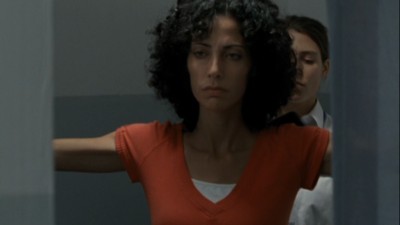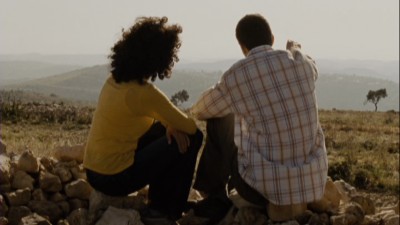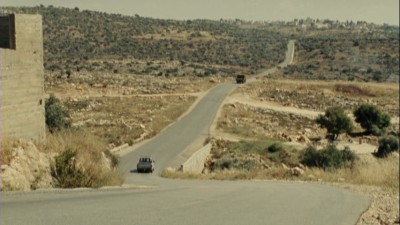| Reviews & Columns |
|
Reviews DVD TV on DVD Blu-ray 4K UHD International DVDs In Theaters Reviews by Studio Video Games Features Collector Series DVDs Easter Egg Database Interviews DVD Talk Radio Feature Articles Columns Anime Talk DVD Savant Horror DVDs The M.O.D. Squad Art House HD Talk Silent DVD
|
DVD Talk Forum |
|
|
| Resources |
|
DVD Price Search Customer Service #'s RCE Info Links |
|
Columns
|
|
|
Salt Of This Sea

Judging from the practically taboo, unavoidably controversial subject matter she takes on in her film, Annemarie Jacir, the writer/director of Salt of This Sea (which, as the copy on the back of the DVD informs us, is "the first feature from Palestine by a female director") is nothing if not brave. The film makes an admirable attempt to convey the effects of the ancient, ongoing, seemingly endless cycle of tension, oppression, and violence between Israel and Palestine by looking at those troubles through their impact on individual lives, specifically Palestinian lives (even thinking about the matter from the POV of ordinary, everyday Palestinians can get you labeled "anti-Semitic" with alarming swiftness; just ask Vanessa Redgrave or Jean-Luc Godard, or the Jewish progressive columnist Glenn Greenwald). But this noble ambition puts Jacir's movie in a tight corner that it is finally unable to negotiate its way out of. To inform and provoke audiences on a political issue by demonstrating it through a dramatic, naturalistically told story requires that the filmmaker take even more care than usual to allow us our suspension of disbelief. It becomes that much more important to carefully stay within that nebulously defined area where individual experience overlaps (as it inevitably does) with the political, without lapsing into a counterproductive reduction of the characters to mere examples or symbols of the larger problems affecting them. It is the difference between artificially grafting a human face onto geopolitical issues and finding the actual, complex human face that those issues really do always have; Salt of This Sea vacillates back and forth between the tedious former and the compelling latter, and one wonders if the resulting crazy-quilt of a movie is somehow the inevitable outcome when a filmmaker sets themselves this steep a challenge.

The film's very first sequence, which includes quick-cut documentary footage of Palestinian territory being razed by invading Israeli tanks and construction equipment, announces the film's concerns upfront. Immediately afterward, we are introduced to our protagonist, Soraya (Suheir Hammad), a Palestine-born American citizen attempting to repatriate to her family's country of origin. This initial sequence raises our hopes for the rest of the film; it is actually a good example of the focus that one wishes had been possible throughout. As Soraya, attempting to cross over from Israel into Palestine, is progressively humiliated by the Israeli bureaucrats guarding the border (who are, after all, well within the bounds of official procedure and technically just doing their job), the situation and all of its interactions and emotions are entirely believable and engrossing in their all-too-"realistic," mundane, impersonally cruel awfulness. The scene is tightly framed and edited in a way that maximizes the tension and drives home the pain caused by the supposedly objective, security-motivated rules and regulations imposed upon the Palestinians. Another sequence, which occurs toward the end of the film, depicts a confrontation between Soraya and the young Jewish woman who now occupies her family's former house, which they were forced to leave when the state of Israel took over. The current resident's ostensible liberalism, evidenced by her inviting Soraya and her companions into the house, has its limits, whereas Soraya's mounting rage at the unfairness suffered by her family is rapidly exceeding any limits it might once have had. This is the film at its most tough, honest, and well-played. It is political consciousness-raising at its most thought-provokingly irreducible: what is "all in the past" to a befuddled, innocent member of an oppressive majority is very immediately present to a rightly enraged, equally innocent member of an oppressed minority.
Unfortunately, the film, however understandably, cannot restrict itself to saying what is reasonably within its ability to say. It begins to undermine itself when we take the leap from Soraya's righteous demands for a numerically small but symbolically significant amount of her grandfather's money, which was confiscated by the newly formed Israeli government that drove him out of his home, and from Soraya's new boyfriend Emad's (Saleh Bakri) frustration with repeated denials of his visa allowing him to accept a Canadian university scholarship, to a crusade that involves car theft and bank robbery. Jacir does nothing to cushion this tonal zero-to-60 lurch; Soraya and Emad's justified anger, it implies, leads directly to near-Travis Bickle-level vigilantism, and we are not told nearly enough about them (Soraya's experience growing up as a Palestinian in the U.S.--which would have constituted the bulk of her life and the basis of her psychology--is left almost entirely unexplored) for this to come across as anything but an arbitrary excuse to turn the film into a road trip.

Despite the unsatisfying manner in which we find ourselves on a road trip with Soraya, Emad, and Emad's filmmaker friend Marwan (Riyad Ideis), Jacir and cinematographer Benoit Chamaillard do their best to compensate; there are a number of really gorgeous, purely visual moments as the trio passes through Israel while on the lam that let us understand why one would be reluctant and combative if forced to forsake such a beautiful land. But ultimately, the film exists in a state of limbo, too often abandoning its by far most interesting dramatic asset--the simultaneous intensity of Soraya and Emad's attraction to one another and the incompatibility of her desire to return to Palestine with his to leave it behind forever--in favor of a rushed onslaught of events that became increasingly numbing and difficult to accept in the context of the film's world.

THE DVD:
The 1.85:1 aspect ratio, anamorphic transfer is clear and vivid; there are no flaws that I could discern, and Benoit Chamaillard's cinematography--one of the highlights of the film, much of which was shot in sunlit exteriors and with more saturated color than usual, sometimes reminiscent of Soderbergh's Traffic--comes through rich and clean.
Sound:The Dolby digital 2.0 soundtrack is crystal clear. Every dimension of the film's sound is squeaky-clean and vivid, with no distortion or other audio glitches whatsoever.
Extras:None to speak of other than a trailer for another, unrelated Kino-Lorber title.
FINAL THOUGHTS:The boldness and ambition that went into the conception of Salt of This Sea, which comes from a point of view in the Palestine-Israel embattlement that has rarely found its way onto film, is absolutely worthy of our respect; but the execution of the film's ideas is a decidedly mixed bag. It suffers from an unevenness and vagueness of tone, and its overall failed attempt to dramatize its (important, granted) political observations leaves us with not much more than a noble experiment that, in its failure, serves mainly to suggest that when one has specific political points to make in a film, one should either go the Mike Leigh route of sublimating them entirely into the story and characters, or the latter-day Godard route of bluntly subsuming any story or character concerns to the film's framing political observations. Trying to have it both ways could well be an impossible proposition; in the case of Salt of This Sea, it has definitely resulted in a filmmaker's compelling political passion (one too urgent, perhaps, for fiction, and better suited to documentary, which has until now been the medium of choice for director Annemarie Jacir) coming out the other end of the creative process as a frustratingly anticlimactic muddle. Rent It
|
| Popular Reviews |
| Sponsored Links |
|
|
| Sponsored Links |
|
|
| Release List | Reviews | Shop | Newsletter | Forum | DVD Giveaways | Blu-Ray | Advertise |
|
Copyright 2024 DVDTalk.com All Rights Reserved. Legal Info, Privacy Policy, Terms of Use,
Manage Preferences,
Your Privacy Choices | |||||||














